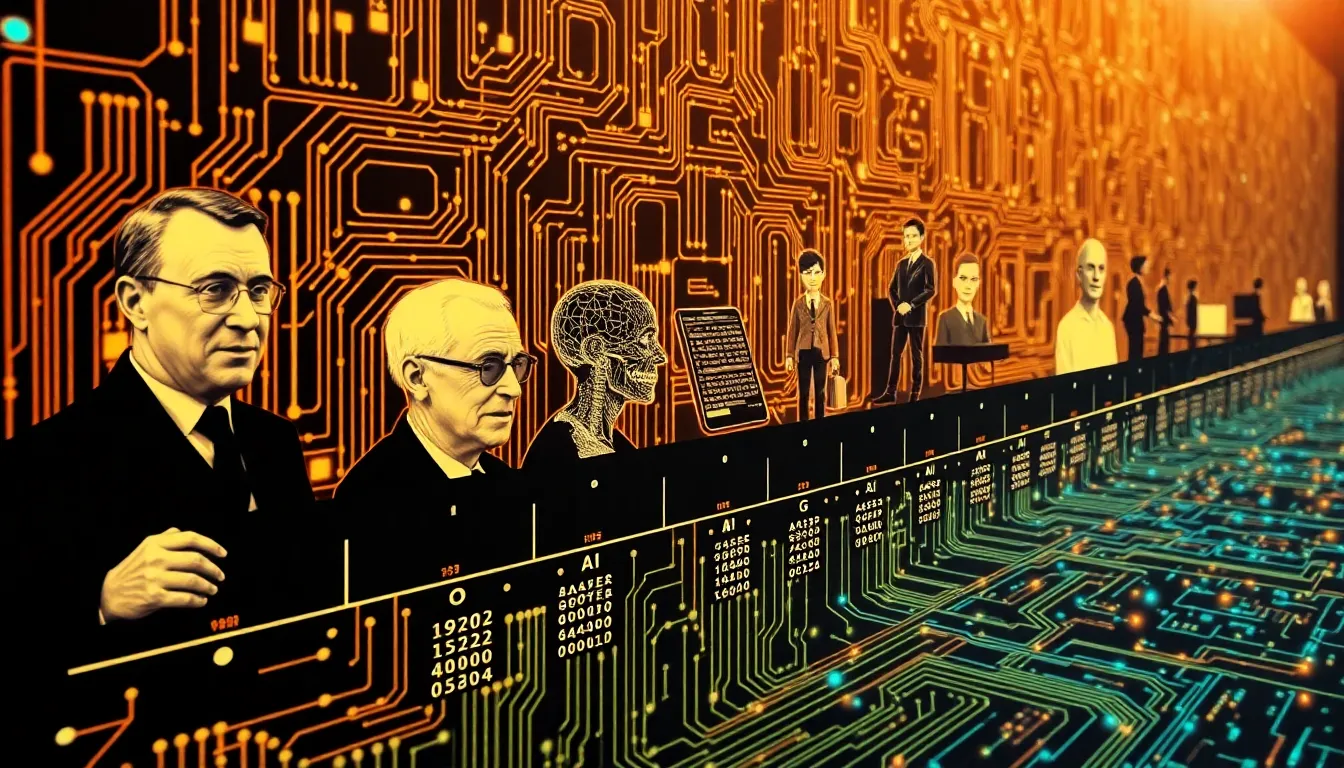Artificial Intelligence is no longer the stuff of sci-fi movies; it’s here, it’s evolving, and it’s ready to take over—well, at least the boring parts of our lives! From chatbots that can hold a conversation better than your uncle at Thanksgiving to algorithms that predict your next binge-watch, AI development is reshaping how we interact with technology every day.
Table of Contents
ToggleOverview of AI Development
AI development encompasses a range of processes and technologies that create intelligent machines capable of performing tasks typically requiring human intelligence. Progress in AI has evolved through various stages, including early research efforts that focused on symbolic reasoning and rule-based systems. Modern advancements rely heavily on machine learning and deep learning, utilizing complex algorithms to analyze vast datasets and improve performance over time.
Neural networks play a pivotal role in deep learning, mimicking the human brain’s architecture to recognize patterns and make predictions. Tools such as TensorFlow and PyTorch provide frameworks for developers to create custom AI models. As developers leverage these tools, they often prioritize creating user-friendly applications that enhance everyday experiences.
Noteworthy applications include natural language processing, which allows machines to understand and respond to human language effectively. Chatbots, for instance, illustrate how AI can automate customer service interactions, providing instant responses and freeing human agents for more complex inquiries. Visual recognition systems also have gained traction, driving innovation in industries like healthcare and automotive, where machines identify abnormalities or navigate environments autonomously.
Data ethics and security remain critical considerations in AI development. Developers navigate challenges related to bias in algorithms and privacy concerns to ensure responsible usage of AI technologies. Ongoing research focuses on creating transparent and fair AI systems.
Overall, the landscape of AI development continues to expand, driven by emerging technologies and increasing demand across sectors. Organizations harness AI to streamline operations, enhance decision-making, and ultimately transform how they operate and serve their customers.
Historical Milestones in AI Development
AI development showcases a rich history marked by pivotal milestones that shaped its current landscape. From theoretical underpinnings to practical applications, each phase contributed to the evolution of artificial intelligence.
Early Beginnings
In the 1950s, the concept of AI emerged with influential figures like Alan Turing, who proposed the Turing Test to assess machine intelligence. John McCarthy coined the term “artificial intelligence” in 1956 during the Dartmouth Conference, facilitating the first AI research collaboration. Early experiments in machine learning focused on simple algorithms and symbolic reasoning, laying foundational concepts for future advancements. By the 1960s, programs like ELIZA simulated human conversation, demonstrating the potential for machines to engage in dialogue.
Significant Breakthroughs
The 1980s witnessed significant breakthroughs with the rise of expert systems capable of solving complex problems by emulating human expertise in specific domains. Advancements in computing power and algorithm efficiency enabled more robust AI systems. The introduction of neural networks in the 1990s marked a turning point, allowing machines to learn patterns from vast amounts of data. Rapid growth in data availability contributed to deep learning techniques. Machine learning gained prominence in the 2010s, revolutionizing industries from healthcare to finance, which relied on AI for predictive analytics and automation.
Current Trends in AI Development
AI development is rapidly evolving, with new trends shaping its future. Significant advancements in machine learning and natural language processing stand out.
Machine Learning Advancements
Innovations in machine learning significantly enhance AI capabilities. Recent breakthroughs focus on improving algorithm efficiency and model accuracy. Developers utilize advanced techniques, such as transfer learning, which allows systems to apply knowledge from one task to another. Enhanced training datasets contribute to better model performance, especially in industries like finance and healthcare. Moreover, automation tools streamline the development process, making it easier for organizations to integrate machine learning into their operations.
Natural Language Processing
Natural language processing continues to transform human-computer interaction. Algorithms now understand context, sentiment, and intent, enabling more natural conversations. Companies increasingly implement AI-powered chatbots to enhance customer service experiences. Furthermore, advancements in language generation lead to more coherent and contextually relevant responses from AI systems. This ongoing evolution encourages developers to create applications that cater to diverse languages and dialects, increasing accessibility for users worldwide.
Challenges in AI Development
AI development faces several challenges that can hinder progress and innovation. Key issues involve ethical considerations and technical limitations.
Ethical Considerations
Ethical concerns arise in AI development primarily due to algorithmic bias and data privacy. Algorithmic bias occurs when AI systems reflect the prejudices found in training data, leading to unfair outcomes. For instance, biased algorithms used in hiring can disadvantage candidates from certain backgrounds. Data privacy stands as another pressing concern; sensitive user data often feeds into AI systems, raising questions about consent and security. Developers must prioritize transparency and fairness while addressing these ethical dilemmas to foster trust and accountability in AI applications.
Technical Limitations
Technical limitations play a crucial role in shaping the effectiveness of AI technologies. Training AI models requires massive datasets, which may not always be available or easy to obtain. Incomplete or poor-quality data can lead to suboptimal model performance, affecting overall reliability. Moreover, complex algorithms often demand significant computational resources, making deployment challenging for smaller organizations. Overcoming these hurdles ensures that AI advancements remain robust and scalable, enhancing their usability across diverse scenarios.
Future of AI Development
The future of AI development promises rapid advancements and transformative changes. Innovations are emerging that could reshape multiple industries.
Predictions and Innovations
Predictions indicate continuous improvements in machine learning algorithms. Enhanced capabilities should allow for better data analysis and more accurate predictions. Breakthroughs in natural language processing will likely lead to AI understanding human interactions more intuitively. Progress in autonomous systems may revolutionize transportation with self-driving vehicles. Many experts foresee the integration of AI across smart cities, optimizing resources and improving quality of life.
Potential Impact on Society
AI’s potential impact on society extends beyond simple automation. Society could experience improved healthcare outcomes as AI analyzes medical data for better diagnosis. Economic landscapes may shift as AI streamlines operations, creating new job opportunities alongside the automation of routine tasks. Education could become personalized, tailoring learning experiences to individual needs through AI-driven platforms. Ethical considerations will remain crucial, influencing policy and shaping public perception as technology continues to advance.
Conclusion
The journey of AI development is far from over. As technology continues to evolve the potential for AI to enhance everyday life grows exponentially. With advancements in machine learning and natural language processing AI is becoming more intuitive and effective in understanding human needs.
Addressing ethical considerations remains paramount as developers strive to create transparent and fair systems. The future promises not only improved efficiency but also a significant impact on various industries including healthcare and transportation. As organizations embrace AI the landscape will continue to shift offering new opportunities and challenges.
The ongoing evolution of AI holds the key to unlocking innovative solutions that can transform society for the better.








